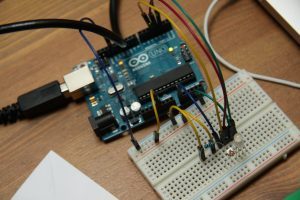The robotics degree at WPI includes a mix of Mechanical Engineering, Electrical Engineering, Computer Science, and Robotics classes. When you declare your major as Robotics, you will meet with a faculty adviser in the Robotics department. Specifically at WPI, there are Program Tracking Sheets.
Essentially, the tracking sheet is a guideline for which courses you should take (or an equivalent) in order to fulfill the requirements for the degree you’re pursuing. The Robotics Major tracking sheet for the class of 2020 can be found here. The guidelines and requirements change for each graduating class, so I recommend taking a look at the main Major Tracking Sheets link (above) to ensure you’re following the latest revision.
Here’s an example project I worked on at WPI. The goal was to pick up blocks on a moving conveyor and sort them by weight.
Now that you have the Robotics tracking sheet, you can elect to take courses within the following categories:
- Humanities & Arts:
- Physical Education
- Social Science
- The Interactive Qualifying Project (IQP)
- Free Electives
- Basic Science (Physics)
- Mathematics
- Entrepreneurship
- Social Implications
- Engineering Science:
- Robotics
- Computer Science
- Electrical & Computer Engineering
- Engineering Electives
- Major Qualifying Project (MQP)
Some categories have specific course numbers (engineering, math, etc.), while other categories allow you to pick and choose from the WPI course catalog. This curriculum is flexible, but very challenging nonetheless. If you know anything about WPI, you’ll know that they run on the quarter system (also known as a Term), where each class is on a 7-week cycle for a total of 4 quarters per year. Typically, students take three classes per Term plus a phys ed class or elective.
Also, if you major in Robotics at WPI, you can choose to complete either a Bachelor of Science (BS), Master of Science (MS), PhD, or the combined BS/MS degree. Typically, the BS degree takes four years; the BS/MS takes five; and the MS/PhD is three to five years after the BS.
If you’ve read this far, that means you must be interested in the Robotics degree or are on the fence about choosing Robotics versus choosing Mechanical or Electrical Engineering. That leads me to my next point:
Robotics is a difficult subject to learn because it’s a black hole.
If you participated on a robotics team in high school, you may think that this degree will be “fun” or “easy.” And, while parts of it are really cool, a lot of parts are really difficult. You have to gain competencies in many highly technical subjects and then have to apply them to the project you’re working on.
Robotics also has two distinct paths: “research” robotics (AI, ROS, etc.), and “manufacturing” robotics (6 DOF Arms, PLC’s, conveyors, heavy machinery, HMI’s, etc.) There’s so much to know and so many “unknown-unknowns” in this field. You’ll never be bored, but it’s also next to impossible to know everything about robotics.
If I had the opportunity to go back and “redo” my robotics experience, I would probably pick a core discipline in Computer Science, Electrical Engineering, or Mechanical Engineering with the intent of applying my competencies to the robotics field. Then, as a pursued a Masters or PhD, I could focus on designing X (circuits, sensors, components, algorithms, etc.) for robotics.
Robotics is also interdisciplinary. If you want to be successful with robotics as a major, you must be passionate about solving very frustrating problems using math, science, physics, electronics, and programming. You must be willing to work in collaborative environments on short deadlines. It’s a very difficult degree, but it’s worth every late night stewing over code that doesn’t compile.
Who would want a Robotics degree from WPI, and why would they want it?
The first part is really simple: you’re the kind of person who likes a frustratingly, rewarding challenge, likes solving problems using a variety of math & science tools—sensors, software, mechanics, and wants to become an engineer.
Even if you have no intent of building robots, the Robotics Engineering degree can be helpful if you want to work for large corporations as an “engineer.” You’ll gain skills in a variety of areas and think critically about complex systems. I think it’s a valuable skillset that employers want to see, on the whole.
The second reason is that robotics careers are on the rise. Think of every device you use—your cell phone, your computer, the car you drive—everything around us is becoming more automated.
Manufacturing is becoming more sophisticated. Robots are performing repetitive assemblies, learning complex algorithms, and providing suggestions based on environmental feedback. If you want to be part of the tech movement, robotics is a solid choice for getting started. But if that explanation was a little vague, I’ve listed out some common career titles that you may want to investigate further.
Some common careers that Robotics Engineers have include:
- Manufacturing/Automation Engineers
- Software Developers
- Mobile Dev/Internet of Things (IoT) Engineer
- Third-party Industrial Robot Integrator
- ME/EE/CS-type jobs
- Business Process Automation Engineer (SAP, SaaS, IoT)
- Robotics Research (Biology/Prosthetics, Drones/Quadcopters, Haptics, Driverless Vehicles, etc.)
- Tech Startups
- Companies focused on high-tech innovations
The options are really limitless. When I was job searching, I leveraged the fact that the robotics degree at WPI provides a foundation in ME/EE/CS as well as the integration component. Being able to thing critically and holistically about a system design versus a component design is a skill that is severely underrated in the market. Bring that to the table and you can persuade most recruiters that you’d be a great fit.
What’s it like to live in Worcester?
Pop quiz: how do you pronounce “Worcester”?
If you pronounced it like the sauce, then you’re completely wrong. It’s pronounced like “Woo-ster”. Got to love the state of Massachusetts. 😀 Despite being the second largest city in Massachusetts, Worcester is definitely not Boston. People don’t move to Worcester because it’s Worcester. They move there because they’re attending one of the consortium schools or for work.
Worcester has more of a “small-town” vibe and there’s really not a whole lot to do in the area. This is probably a good thing, considering that your WPI degree should be your primary focus. 😉
With that said, the WPI community has a lot to offer. With a brand new fitness center and athletic program, new labs and studios, on-campus dining, a great library, and social organizations for nearly every cause, the opportunities are endless as to what you become involved in.
Climate in Worcester is pretty typical New England – winters are cold, snowy, and gray, Spring, Summer, and Fall are sunny, moderately warm, and scenic. If you like New England, Worcester is affordable (apartments are older), but it’s a generally nice place to attend school.




